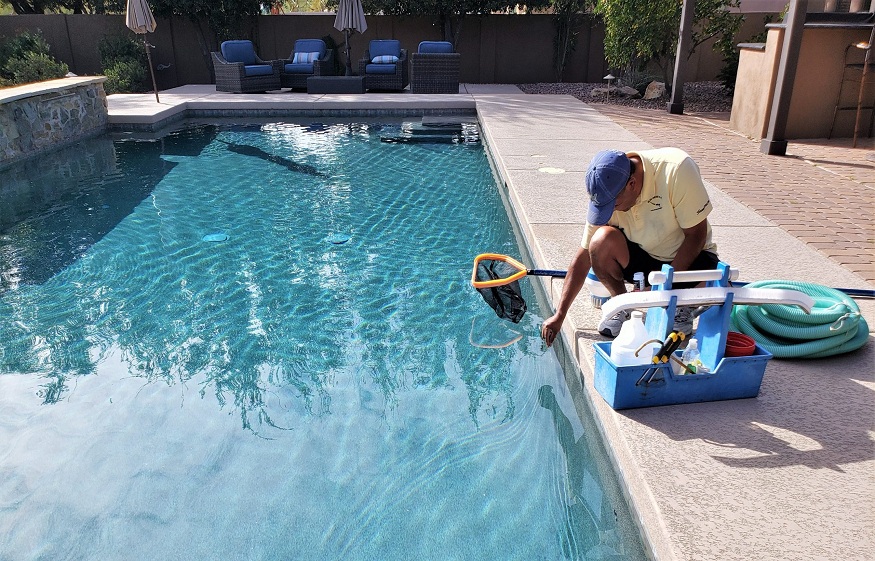The pool is a beautiful place to chill out, enjoy yourself, and keep busy. Regular care is required to remain clean, secure, and durable. It is important to be aware of the typical challenges faced when maintaining pools, even though swimming pool maintenance services can assist in properly addressing these issues. Let’s investigate these issues and give some solutions.
Maintaining the Best Filtration:
Systems for pool filtration must eliminate impurities and maintain water purity. Filters can, however, clog and need to be cleaned or replaced frequently. It is crucial to check the filter pressure and clean or backwash the system as required.
Fixing Equipment Issues:
Swimming pools have a variety of equipment, including pumps, heaters, and automated systems, all of which have the potential to malfunction. Poor water circulation brought on by a broken pump might reduce the efficiency of the filtering system. Routine inspection, maintenance, and quick repairs are crucial to maintain the equipment running properly and prevent expensive replacements.
Pool surface routine maintenance:
To maintain their cleanliness, look, and longevity, pool surfaces, including the walls, floor, and tiles, require routine care. These surfaces are subject to accumulating scale, stains, dirt, and grime over time, reducing the aesthetic of the pool and making cleaning it more challenging. The condition of pool surfaces must be regularly maintained in order to avoid long-term harm.
Cleaning Solutions:
For the purpose of maintaining pool surfaces, the proper cleaning solutions must be used. To prevent damage, different surfaces can need different cleaning solutions. For instance, alkaline-based cleansers may be more effective on concrete surfaces than mild, soft cleaners on tiled surfaces. It’s crucial to adhere to the manufacturer’s recommendations and special cleaners safe for the pool surface. Avoid using harsh chemical items that can damage the surfaces or scratch them.
Brushing:
Cleaning pool surfaces with a brush on a regular basis is an efficient approach to removing dirt, algae, and other impurities. It keeps the surfaces clean and free of discoloration by preventing stains and scale formation. Make use of a pool brush with surface-appropriate bristles. At least once a week, brush the walls, floor, and other surfaces prone to buildup. Pay close attention to steps, corners, and nooks where dirt and algae like to collect.
Washing with acid:
On rare occasions, scale buildup or tenacious stains may appear on pool surfaces and remain after routine cleaning. A more forceful cleaning technique known as “acid washing” is used to get rid of stubborn stains and deposits. It is vital to remember that using too much or improperly might harm the pool surfaces. Thus, acid washing should always be done sparingly and carefully. To find out whether acid washing is required and to make sure the proper safety precautions are taken, consult a professional pool care provider.
Maintenance and repair of Tile and Grout:
Regular tile and grout cleaning is necessary for pools with tiled surfaces to avoid loss and fading. Regularly inspect the tiles and immediately replace any that are broken or damaged. Use a brush and mild cleansers designed for the hairline to clean the grout lines. Avoid harsh cleaning agents or other abrasives that harm the tiles or grout. The tiles can be better protected and cleaned by using a tile sealant.
Chemistry of water and filtration:
For maintaining pool surfaces, adequate filtration and appropriate water chemistry are essential. Unbalanced water chemistry, such as high acidity or alkalinity, can damage surfaces over time. Testing and adjusting the pool’s pH, alkalinity, and sanitizer levels frequently ensure they are within the advised ranges. Keeping a functioning filtration system that helps remove dirt and pollutants from the water reduces the possibility of surface discoloration or damage.
Periodic Inspection:
Keep an eye out for any irregularities, like chips, cracks, or discoloration. Address any issues immediately to prevent further damage. You are advised to contact a professional swimming pool maintenance provider for an accurate assessment and repair if you observe any structural damage or significant degradation.
Issues with the structure and water leaks:
Significant difficulties arise when maintaining a swimming pool due to structural problems and water leaks. It’s essential to recognize these issues as soon as possible in order to stop future harm, water loss, and other safety risks.
Identifying Water Leaks:
Detecting water leaks in a swimming pool can be challenging as they originate from various sources. Here are some common signs that indicate a possible water leak:
A noticeable drop in water level despite normal evaporation.
Constantly running or overflowing water from the pool.
Wet or soggy areas around the pool deck or equipment.
Unexplained increase in water bills.
Causes of Water Leaks:
Water leaks in swimming pools can occur due to several reasons, including:
Plumbing leaks: Faulty or damaged pipes, fittings, or valves can lead to water leaks.
Cracks in the pool shell:
Over time, the pool shell may develop cracks due to settling, ground movement, or structural issues.
Damaged or deteriorated pool equipment:
Leaks can occur from equipment such as pumps, filters, or heaters if their seals, gaskets, or connections are compromised.
Skimmer or return line leaks: Faulty seals or fittings in skimmers or return lines can cause water to leak.
Addressing Water Leaks:
When faced with a suspected water leak, it is advisable to follow these steps:
Make a visual assessment:
Look for any obvious leak indicators, such as damp spots, drips, or pool shell cracks.
Conduct a dye test:
Water near potential leak spots can be colored with food coloring to see if the color is drawn to the leak.
Track water loss:
Check the water loss rate over time to see if it is higher than typical evaporation.
Consult a specialist:
Consult a skilled pool care specialist or leak detection expert if the leak is persistent or difficult to locate.
Conclusion:
It’s important to be conscious of the numerous problems that could occur since a swimming pool needs ongoing upkeep. You must handle equipment problems, keep the pool’s surfaces clean, reduce algae growth, deal with debris, assure correct filtration, maintain water chemistry balance, and repair leaks in order to maintain a swimming pool efficiently. Pool owners may overcome these difficulties and provide a clean, safe, and welcoming swimming experience by being proactive and seeking expert assistance.

